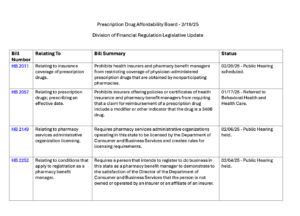11 comments were reviewed by the board and posted to the website. There were six requests to speak in person.
Lorren Sandt, Caring Ambassadors Program had a question and a comment regarding patient information requests [on page 50 of the meeting packet]: “Are there therapeutic alternatives1 (for example, a different therapeutic agent) for this drug?”
"This is not intelligible to patients. Not requiring confidentiality means that people won’t answer it. What are you doing for to ensure that you’re going to [get a] wide [variety of] answers. Will you include what the patients have to say in the final executive summary, or will you bury it in a table?"
Tiffany Westrich-Robertson, Patient Inclusion Council, AIA Arthritis and other groups commented that most patients would say that there are not therapeutic alternatives to their care. Some questions are too technical for patients (i.e. difference between dosage and strength). She submitted a lengthy letter covering these topics in detail.
Scott Bertrani, Health HIV said that 340B needs to be included to ensure that HIV patients and orphan drug patients are treated sufficiently.
Dharia McGrew, PhRMA will be submitting a letter after this month's meeting. She was concerned that the Stakeholder RFI forms do not require confidentiality, and the PDAB should keep confidentiality. She said that stakeholders will not provide information if it isn't kept confidential and the PDAB’s use of the information is not explained up front. Clear definitions and explanation of methodology are needed.
Marty Carty, Oregon Primary Care Association expressed concern that the material submitted in the RFI is subject to public display. The information could lead to unfair contracting practices with payers or manufacturers. Questions 6 and 11 caused the most concern. All covered entities in the state should be subject to the RFI. The board should take a larger view of covered entities that use 340B savings.




